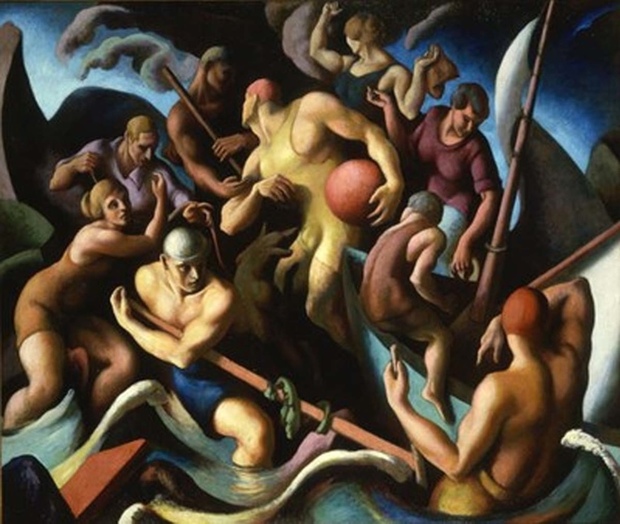
At the end of the valley, as John Bunyan mentions, is a cavern, where, in his days, dwelt two cruel giants, Pope and Pagan, who had strown the ground about their residence with the bones of slaughtered pilgrims. These vile old troglodytes are no longer there; but into their deserted cave another terrible giant has thrust himself, and makes it his business to seize upon honest travellers and fatten them for his table with plentiful meals of smoke, mist, moonshine, raw potatoes, and sawdust. He is a German by birth, and is called Giant Transcendentalist; but as to his form, his features, his substance, and his nature generally, it is the chief peculiarity of this huge miscreant that neither he for himself, nor anybody for him, has ever been able to describe them. As we rushed by the cavern’s mouth we caught a hasty glimpse of him, looking somewhat like an ill-proportioned figure, but considerably more like a heap of fog and duskiness. He shouted after us, but in so strange a phraseology that we knew not what he meant, nor whether to be encouraged or affrighted.
—Nathaniel Hawthorne, “The Celestial Railroad” (1843) in the Complete Novels and Selected Tales of Nathaniel Hawthorne, pp. 1070-1082 (1937).
Nathaniel Hawthorne’s “Celestial Railroad” can easily be read in a quick sitting and is a first-class parody. Moreover, Hawthorne is sufficiently clever in going about his task that he lampoons just about everybody and leaves a certain degree of doubt about exactly where he stands. Those who know Hawthorne’s works from high school or college associate him with the stern Puritanism that underlies (and is critiqued in) The Scarlet Letter, but they may also know his flirtations with Transcendentalism and Renaissance humanism apparent in works like The Marble Faun. This story stands astride these two tendencies in his writing. At the first level, he is parodying the classic work of Puritan literature, John Bunyan’s Pilgrim’s Progress. This he does brilliantly. It’s clear that he, like many of the intellectual leaders of New England in the early nineteenth century, finds the Puritan approach to religion a bit tired and ill-attuned to the modern world. They examine a number of alternatives–German idealism, especially Transcendentalism, Catholicism, and even faith in science. The mature Hawthorne exhibits fascination for German philosophy and for the Catholic faith and particularly the culture in Italy that it has helped to shape, but in this short story they receive a back of the hand. The strongest contempt is reserved for blind faith in science. That takes the form of the celestial railroad itself–together with its promise to whisk its passengers to the Celestial City without the trials and ordeals that Bunyan faced on his pilgrimage. This faith is misplaced, Hawthorne tells us–the railroad offers an amusing ride, but it never pulls into the end station. Hawthorne plainly has more sympathy for the stout-hearted faith of Bunyan’s hero. But he also sees that the Puritan model foments intolerance and has a latent hostility to science that holds its people back. These shortcomings must be overcome, just as the essential truth of the pilgrim’s tale is preserved.
Listen to Charles Ives’s “The Celestial Railroad, a Phantasy for Solo Piano” (1925) in a performance by Alan Mandel. From a program note by Thomas M. Brodhead about the work:
The Celestial Railroad (which he titled “Phantasy” on one manuscript) is a musical depiction of the short story “The Celestial Railroad” by Nathaniel Hawthorne. In Hawthorne’s tale (which is a satirical take on Bunyan’s book The Pilgrim’s Progress), a man falls asleep and dreams of a fantastic train that speeds its passengers in nineteenth-century comfort to the Celestial City. Befriended by “Mr. Smooth-it-away,” the narrator boards the train with others just before it springs into motion. The train passes many horrible sights, makes stops at temptation-filled towns such as Vanity Fair, and finally comes to rest at Beulah Land on the river Jordan. Here, one faintly hears solemn hymns across the river. Everyone leaves the train to take a ferry toward the Celestial City. Once the boat is in motion, however, the narrator discovers that “Mr. Smooth-it-away” is no longer with him but back on the shore, having reverted to his true demonic form. The narrator realizes that all has been a hoax and flings himself into the water in hope of escape. The shock of the impact wakes him, and the comic nightmare comes to a close. In the finale of Ives’s Celestial Railroad, the composer lends the ending a hometown twist: The man awakens to the sound of Fourth of July celebrations at Concord, Massachusetts. As quickly as he is jolted awake by the high spirits of the town marching band, the music recedes, and the marchers evaporate in the distance.


